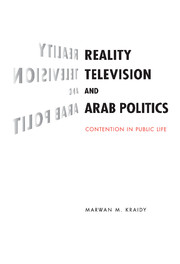Book contents
- Frontmatter
- Contents
- Acknowledgments
- Preface
- Introduction: Beyond al-Jazeera
- 1 Screens of Contention: The Battle for Arab Viewers
- 2 Voting Islam Off the Island? Big Brother in Bahrain
- 3 The Saudi-Lebanese Connection
- 4 Contesting Reality: Star Academy and Islamic Authenticity in Saudi Arabia
- 5 Gendering Reality: Kuwait in the Eye of the Storm
- 6 A Battle of Nations: Superstar and the Lebanon-Syria Media War
- 7 The “New Middle East”? Reality Television and the “Independence Intifada”
- Conclusion: Performing Politics, Taming Modernity
- List of Interviews
- Further Readings
- Bibliography
- Index
- Titles in the Series
6 - A Battle of Nations: Superstar and the Lebanon-Syria Media War
Published online by Cambridge University Press: 05 June 2012
- Frontmatter
- Contents
- Acknowledgments
- Preface
- Introduction: Beyond al-Jazeera
- 1 Screens of Contention: The Battle for Arab Viewers
- 2 Voting Islam Off the Island? Big Brother in Bahrain
- 3 The Saudi-Lebanese Connection
- 4 Contesting Reality: Star Academy and Islamic Authenticity in Saudi Arabia
- 5 Gendering Reality: Kuwait in the Eye of the Storm
- 6 A Battle of Nations: Superstar and the Lebanon-Syria Media War
- 7 The “New Middle East”? Reality Television and the “Independence Intifada”
- Conclusion: Performing Politics, Taming Modernity
- List of Interviews
- Further Readings
- Bibliography
- Index
- Titles in the Series
Summary
Two small spontaneous riots erupted in Beirut on a summer evening in 2003 over the results of Superstar, the Arabic version of Pop Idol (and American Idol). The first brawl occurred at the Beirut Hall, a concert venue where the Superstar semifinals had just concluded. Several people fainted, including the mothers of two semifinalists and the third semifinalist herself, who lost consciousness after learning she had moved on to the finale. The second scuffle unfolded one mile away, when fans of the ousted semifinalist gathered spontaneously in front of Future TV studios in the Spears neighborhood to protest the decision. An hour earlier, Future TV, the Lebanese channel owned by the family of Rafiq al-Hariri, had announced voting results of the semifinal. What gave the two commotions their poignancy was the fact that the Lebanese contestant Melhem Zayn was eliminated while the Syrian candidate Rowayda ‘Attiyeh was elevated to the finale. Reactions to the victory of a Syrian contestant over a Lebanese one, on a Lebanese program, betrayed a complex political situation of Lebanese patriotism rising against protracted Syrian dominance. Though Superstar drew one of the largest pan-Arab audiences in history, the contentious events of August 11, 2003 would bring specifically Lebanese concerns to the program's forefront.
Events unfolding on and around Superstar from its first season in 2003 through its third in 2006 reflect the historic reversal in the Lebanese-Syrian relationship between those years.
- Type
- Chapter
- Information
- Reality Television and Arab PoliticsContention in Public Life, pp. 144 - 165Publisher: Cambridge University PressPrint publication year: 2009

